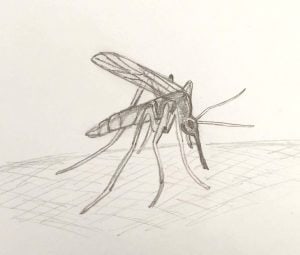The Zika virus is making news again. Local transmission has officially occurred in the U.S., according to the Centers for Disease Control (CDC). Mosquito spraying in South Carolina killed millions of bees and scientific consensus confirms links from the disease to microcephaly and Guillain-Barre Syndrome according to the World Health Organization (WHO).

Drawing by Dr. James Bray
The recent bee killing in South Carolina was a consequence of spraying pesticides to control the mosquito population and prevent Zika. The CDC reports that the mosquitos that have the potential to become infected with Zika and spread it live all over the U.S. The southern coast of the country has higher populations of the mosquito species.
The WHO website confirms the suspected link between Zika, microcephaly and Guillain-Barre Syndrome. Microcephaly is a condition in which a baby’s head is much smaller than normal due to malfunctioned brain development. Guillain-Barre Syndrome is an autoimmune condition where the immune system attacks the nervous system.
The virus is a rather mild disease with symptoms that are not deadly to most people. According to the CDC, one in five people who are infected will actually become ill. The symptoms of the virus include fever, rash, joint pain and conjunctivitis (pink eye). A person becomes infected when the disease is transmitted to them by a species of mosquito known as Aedes. The symptoms typically only last a few days and people are rarely hospitalized.
Local transmission has been reported in Miami, Florida. Transmission occurs after an uninfected mosquito bites an infected person and then the now infected mosquito bites a healthy person. Currently, Florida is the only location in the U.S. where this type of infection has occurred. However, the CDC states that there have been 2,686 reports of travel-related Zika in the U.S. Other current danger zones include Central and South America, the Pacific Islands, the Caribbean, Singapore and Cape Verde in Africa.
The CDC recommends several ways to prevent the virus. First, pregnant women or women who could become pregnant should not travel to locations with known active transmission of the virus. The best way to prevent getting the virus is to prevent mosquito bites by using insect repellent, wearing long sleeve shirts and pants and staying in places that are difficult for mosquitos to access. Chair of biology Dr. James Bray added, “At this point I think we should be informed; I don’t know that concern is warranted at this point.
